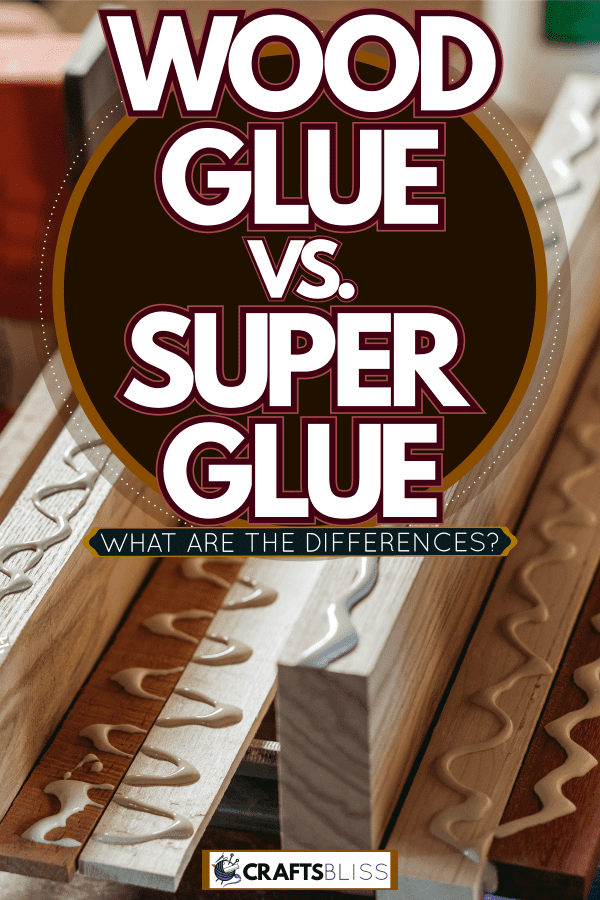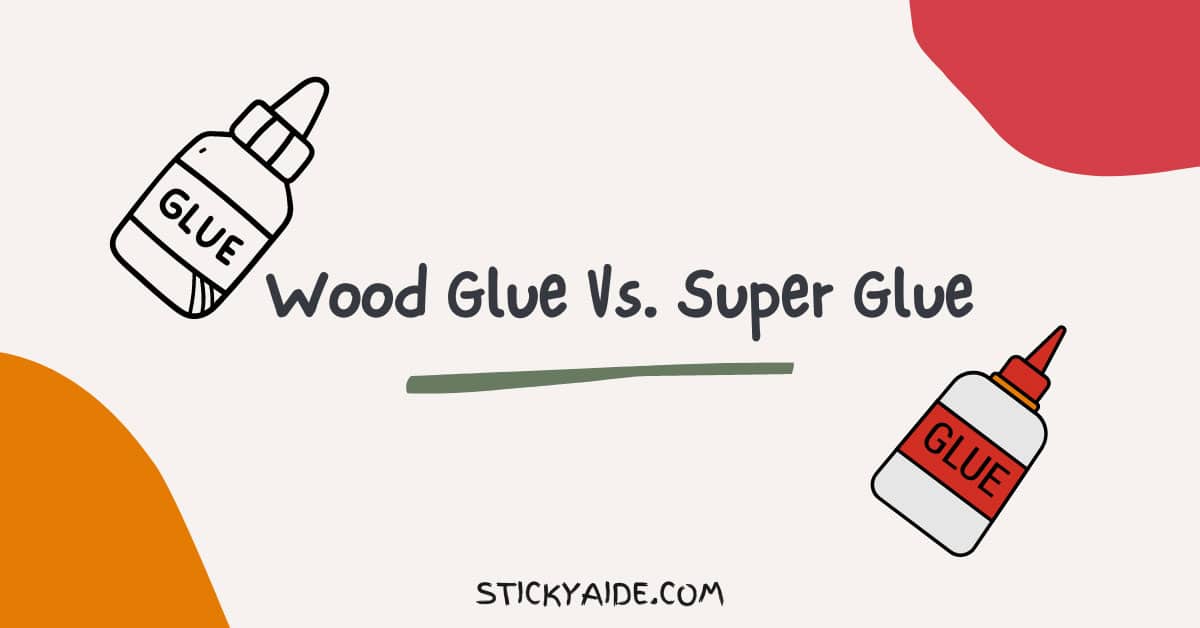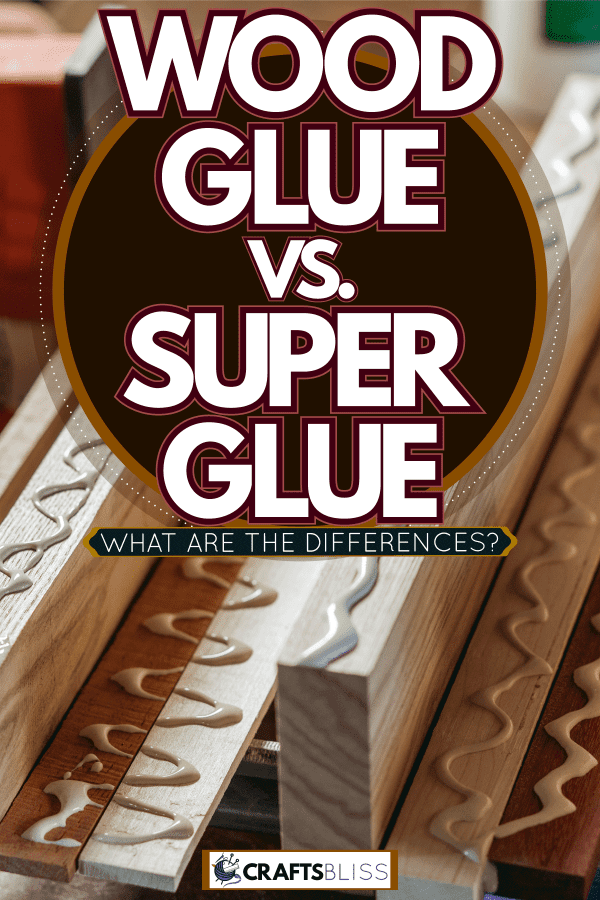Are you wondering if super glue is better than wood glue? Well, you’ve come to the right place! In this article, we’ll dive into the world of adhesives and compare these two popular options. So, whether you’re an aspiring DIY enthusiast or simply curious about glue, let’s explore the differences between super glue and wood glue.
Now, let’s address the burning question: Is super glue better than wood glue? It’s a common query, and we’re here to shed some light on the topic. We’ll examine the characteristics, uses, and advantages of each adhesive, helping you make an informed decision for your projects. So hold on tight and get ready to become the glue expert you never thought you’d be!
Before we begin, let’s clear up any confusion. You might already know a thing or two about super glue and wood glue, but we’ll break it down for you. Super glue is an incredibly strong adhesive that forms an instant bond, while wood glue is specifically designed for woodworking projects. So, if you’re ready to explore the differences in depth, keep reading!
When it comes to bonding materials, the choice between super glue and wood glue depends on the project at hand. Super glue is ideal for small repairs, providing a strong, instant bond on various surfaces. On the other hand, wood glue is designed specifically for woodworking projects, offering a reliable and durable bond for wooden surfaces. Consider the nature of your project to determine which glue is better suited to your needs.

Is Super Glue Better Than Wood Glue?
When it comes to bonding materials, the choice between super glue and wood glue can be a tough one. Both types of glue have their strengths and weaknesses, and the decision ultimately depends on the specific project at hand. In this article, we will delve into the differences between super glue and wood glue, exploring their respective properties, uses, and overall effectiveness. By the end, you’ll have a better understanding of which glue is better suited for your needs.
The Properties of Super Glue
Super glue, also known as cyanoacrylate adhesive, is a fast-setting adhesive that forms a strong bond between various materials, including wood. Its unique properties make it an ideal choice for certain projects. One of the key advantages of super glue is its fast curing time. Within seconds, it forms a solid bond that can withstand significant forces. Additionally, super glue is resistant to water and most chemicals, making it suitable for use in both indoor and outdoor applications.
However, it’s important to note that super glue may not work well on porous surfaces, as it tends to absorb into the material, weakening the bond. It is also not suitable for applications that require flexibility, as super glue can become brittle over time. Despite these limitations, super glue is widely used for tasks that require quick repairs, strong bonding, and tight fits, making it a popular choice among craftspeople, DIY enthusiasts, and professionals alike.
The Benefits of Super Glue
Super glue offers several advantages over other types of adhesives. Firstly, its fast curing time allows for efficiency and instant bonding. Whether you’re fixing a broken ornament or assembling intricate pieces, super glue can provide quick and reliable results. Additionally, super glue’s resistance to water and chemicals ensures durability, making it suitable for long-lasting projects. Its versatility and ability to bond various materials further add to its appeal.
Moreover, the small size and portability of super glue containers make them convenient for on-the-go repairs. You can easily take a bottle of super glue with you wherever you need it, providing a reliable solution for unexpected breakages. Whether you’re working in the workshop, at home, or in a professional setting, super glue’s convenience and effectiveness make it a valuable addition to any toolbox.
In summary, the properties and benefits of super glue make it an excellent choice for quick fixes, tight bonding, and projects that require resistance to water and chemicals. However, it may not be suitable for porous materials or applications that require flexibility.
The Properties of Wood Glue
Wood glue, also known as carpenter’s glue or PVA glue, is specifically formulated for bonding wood surfaces together. It is a strong adhesive that creates a durable bond, suitable for various woodworking projects. Unlike super glue, wood glue has a longer curing time, requiring clamping of the materials to maintain pressure until the bond is fully formed. However, this extended curing time allows for repositioning and adjustments during assembly.
One of the key advantages of wood glue is its ability to penetrate porous surfaces like wood fibers, providing a strong and solid bond. It also offers good heat resistance, which is important for projects that may be exposed to high temperatures. Wood glue is also often waterproof once it has cured, making it suitable for indoor and outdoor applications, as well as projects that may come into contact with moisture.
The Benefits of Wood Glue
Wood glue is highly valued in the woodworking community for its strength, versatility, and ease of use. Its ability to bond wood fibers together creates a durable and sturdy joint, making it suitable for structural and decorative projects alike. Wood glue also allows for easy cleanup with water, making the application process relatively hassle-free.
Additionally, wood glue is non-toxic, making it safe to use indoors. This is particularly important for people who work on woodworking projects in enclosed spaces or have concerns about the environmental impact of the materials they use. Unlike certain adhesives that emit strong fumes, wood glue is an excellent option for those seeking a safer alternative.
In summary, wood glue’s properties and benefits make it an excellent choice for woodworking projects that require strong, durable bonds. Its ability to penetrate porous surfaces, resistance to heat and water, and ease of cleanup contribute to its appeal among woodworkers and craftsmen.
Choosing the Right Glue for Your Project
Now that we’ve explored the properties and benefits of both super glue and wood glue, let’s discuss how to choose the right glue for your specific project. While both glues are effective in their own ways, certain factors can help you make an informed decision.
Project Type
Consider the nature of your project and the materials you’ll be working with. If you’re repairing a broken wooden chair or building a wooden structure, wood glue is generally the better choice. Its ability to bond wood fibers and withstand pressure makes it ideal for such applications. On the other hand, if you need a quick fix or are working with materials other than wood, super glue might be the more suitable option.
Intended Use
Think about the purpose of your project and the conditions it will be subjected to. If your project will be exposed to water, humidity, or extreme temperatures, opting for a waterproof wood glue would be wise. Conversely, if you need an adhesive for a non-porous surface or a temporary fix, super glue is likely the better option.
Working Time
Consider the amount of time you have to work with the adhesive. Wood glue requires clamping and drying time, which means you’ll need to account for longer curing periods. If your project allows for extra time or if you need flexibility during the assembly process, wood glue is the more suitable choice. If you need an instant bond that requires minimal adjustment time, super glue is the way to go.
Flexibility
If your project requires flexibility, such as joining materials that may expand or contract, wood glue is generally a better option. Wood glue allows for some movement, ensuring that the bond remains intact even when subjected to stress. Super glue, however, can become brittle over time and may not withstand prolonged flexing or movement.
Personal Preference
Finally, consider your personal preferences and past experiences with each adhesive. If you’ve had success with either super glue or wood glue in the past, it may be worth sticking with what you know works well for you. Additionally, experimentation and trial and error can help you discover which glue yields the best results for your specific projects.
The Final Verdict
In the eternal showdown between super glue and wood glue, there isn’t a definitive winner. Both adhesives have their own unique properties, benefits, and areas of application. Super glue is excellent for quick repairs, tight bonding, and resistance to water and chemicals, while wood glue excels in providing durable bonds for woodworking projects, heat resistance, and non-toxicity. Ultimately, the choice between super glue and wood glue rests on the specific project requirements and considerations discussed above. So, next time you’re faced with a bonding dilemma, assess your needs and make an informed decision. Happy gluing!
Key Takeaways: Is Super Glue Better than Wood Glue?
- Super glue is great for small and quick fixes on various materials.
- Wood glue is specifically designed for woodworking projects and provides a stronger bond for wood.
- Super glue dries quickly, while wood glue requires more drying time.
- Super glue is not as flexible as wood glue, which can impact its performance on certain projects.
- The choice between super glue and wood glue depends on the specific material and project requirements.
Frequently Asked Questions
Are you wondering which glue is better, super glue or wood glue? Look no further! Here are the answers to your burning questions.
Can super glue be used on wood?
Absolutely! Super glue, also known as cyanoacrylate adhesive, can be used on wood. It forms a strong bond with wood surfaces, making it ideal for smaller woodworking projects or repairs. However, it is important to note that super glue may not be the best choice for larger wood projects or when joining pieces that undergo a lot of stress. In such cases, using wood glue might be more suitable as it provides a stronger and more flexible bond.
When using super glue on wood, keep in mind that it bonds quickly, so you need to work fast. Additionally, make sure to prepare the surfaces properly by cleaning and sanding them to ensure a strong bond. Overall, using super glue on wood can be effective for certain applications, but it may not always be the best option depending on the size and stress the project entails.
Is wood glue stronger than super glue?
Wood glue, also known as carpenter’s glue or PVA glue, is specifically designed for bonding wood surfaces. It forms a strong bond by penetrating the wood fibers and creating a bond that is sometimes even stronger than the wood itself. Unlike super glue, wood glue allows for more flexibility in the joint, making it ideal for larger woodworking projects or applications that require additional strength.
While both super glue and wood glue have their strengths, it would be inaccurate to say that one is universally stronger than the other. Super glue excels in bonding small objects quickly, while wood glue is better suited for larger and more demanding woodwork. It’s important to consider the specific requirements of your project and choose the appropriate glue accordingly.
Does super glue work better on plastic or wood?
Super glue can work effectively on both plastic and wood, but its performance may vary depending on the specific type of plastic or wood you are working with. When it comes to plastic, super glue generally forms a strong bond on smooth and non-porous surfaces, such as hard plastics (like acrylic or PVC). However, it may not be as effective on porous or flexible plastics, as the bond may not be as strong or durable.
When it comes to wood, super glue can work well on most types of wood, especially when used for small projects or repairs. However, for larger wood surfaces or projects that require additional strength, such as furniture construction, using wood glue would be a better choice. Wood glue provides a more secure and durable bond, giving you peace of mind that your woodwork will hold up over time.
Is super glue more versatile than wood glue?
Super glue and wood glue each have their unique set of characteristics, making them suitable for different applications. Super glue is known for its quick bonding strength and ability to bond various materials, including wood, plastic, metal, and more. Its versatility makes it a popular choice for smaller projects, repairs, and crafting.
On the other hand, wood glue is specifically formulated for wood surfaces and excels in providing a strong and durable bond for woodworking projects. It offers more flexibility, allowing for natural movement in the wood without compromising the joint. Additionally, wood glue can be sanded and painted over, making it ideal for finishing touches on woodwork.
Ultimately, the choice between super glue and wood glue depends on the requirements of your specific project. Consider factors such as the materials you are working with, the size of the project, and the level of durability needed to determine which glue is more suitable for you.
Can super glue replace wood glue?
While super glue can be used in certain woodworking applications, it is not meant to replace wood glue altogether. Super glue’s quick bond strength and versatility make it a valuable tool for specific projects, especially when working with smaller wood pieces or doing quick repairs. However, for larger wood joints or projects that require additional strength, wood glue is the preferred choice.
Wood glue provides a stronger and more flexible bond, making it better suited for woodworking. It allows for natural movement in the wood without compromising the joint’s integrity, while also being able to withstand stress and pressure over time. Additionally, wood glue is designed to seep into the wood fibers, improving the bond strength and durability.
When considering using super glue instead of wood glue, carefully assess the specific requirements of your project and choose the glue accordingly. In some cases, a combination of both super glue and wood glue may be the best solution, depending on the size, complexity, and overall demands of the project.

Summary
So, what did we learn about super glue and wood glue? Super glue is great for small repairs, dries quickly, and works well on non-porous materials like metal and plastic. On the other hand, wood glue is specifically designed for woodworking projects, bonds well with porous surfaces, and allows for better flexibility.
In conclusion, both super glue and wood glue have their own strengths and weaknesses. It really depends on the project you’re working on and the materials you’re using. So, next time you need to stick something together, think about what will work best for your specific situation!
